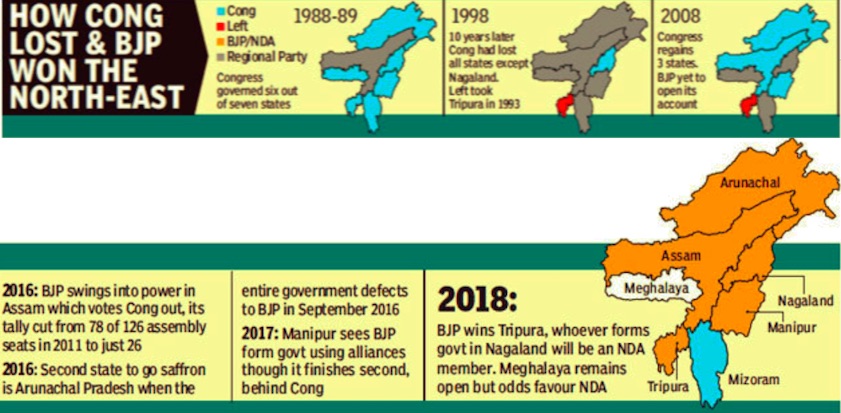Tripura: assembly elections
This is a collection of articles archived for the excellence of their content. |
Contents |
Voting pattern, party-wise
1988-2018
Prabin Kalita, March 4, 2018: The Times of India

From: Prabin Kalita, March 4, 2018: The Times of India
HIGHLIGHTS
The Left did not anticipate the advantage BJP would derive from the Centre’s move to amend the Citizenship Act of 1955 to make illegal migrants eligible for citizenship on the basis of religion.
The influx of Hindu Bengali refugees post-Partition and the 1971 war had reduced the indigenous tribals from the majority community to a minority.
In 2016, Prime Minister Narendra Modi’s slogan of driving out every single illegal Bangladeshi migrant from the country drove voters in Assam to press the button in favour of BJP.
The same formula was nuanced two years later to deliver another winning performance in Tripura+ , despite the majority voters here being those who had entered the once-tribal state from across the border.
Why did Bengali-majority Tripura respond so positively to this? The answer is clear. The Left did not anticipate the advantage BJP would derive from the Centre’s move to amend the Citizenship Act of 1955 to make illegal migrants eligible for citizenship on the basis of religion.
It was music to the ears of the majority community in the border state, where most migrants from erstwhile East Bengal and Bangladesh are Hindus. The influx of Hindu Bengali refugees post-Partition and the 1971 war had reduced the indigenous tribals from the majority community to a minority.
According to the 2011 Census, tribals constitute around 30% of the population against the 66% of non-tribal Bengali Hindus. Knowing well that without the 20 seats reserved for the tribals, it would be impossible to snatch Tripura from the Left, BJP tied up with the Indigenous People’s Front of Tripura, which has been fighting for a separate tribal state.
It, however, took care to assuage Bengali-Hindu feelings by being noncommittal on the issue of statehood. “We told the tribals that much of the amendment would be of little relevance in Tripura,” said a senior BJP functionary. The Left did not help its own cause by holding the view that the amendment would not much impact the state’s demographics. But there is work ahead for BJP now with tribal groups expressing apprehension about the change in law. “We were reduced to a minority in our own land by the influx from Bangladesh,” said Bijoy Kumar Hrangkhawl, president, Indigenous Nationalist Party of Tripura. “This a major threat to us.”

From: Prabin Kalita, Can Right Cadre Trip Left Sarkar?, February 14, 2018: The Times of India
See graphic:
1998-2013- The vote share of the political parties in Tripura’s assembly elections
2018

From: Prabin Kalita, BJP The New Sarkar In Tripura, March 4, 2018: The Times of India
See graphic:
The Tripura Assembly elections of 2013 and 2018: the overall results and main trends